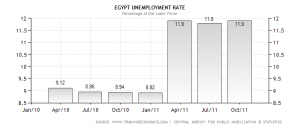The Arab Spring uprising is one that has impacted many countries in the Middle East and Northern Africa with large Arab populations. The unrest has forced many countries to change the ways in which they do economic planning. It has put pressure on governments to increase economic opportunities. Ways in which governments do this is through providing more jobs or by increasing wages paid to the workers. To really understand the impact of the Arab Spring movement we must first understand what the movement is.
The Arab Spring movement is one that was motivated by issues such as unfair government policies, human rights violations, and economic decline. Specifically in the country of Algeria, the uprising came as a result of a lack of decent housing for its citizens. During these initial protests 59 people were reported as injured by police brutality. Despite these initial protests, Algeria had been able to remain somewhat under the radar during the recent years of Arab Spring protests. This is surprising considering Algeria has a rich history of political protests, which end in violence for both sides. The Algerian’s knowledge of what can happen during these political upheavals is a major reason that the country has stayed out of the spotlight.
The Algerian population was primarily seeking better food prices. In response to these demands the government implemented short-term reforms that lowered the cost of certain foods such as milk, cooking oil, and sugar. The subsidies on these goods were matched by increased wages in the public sector as well as a decrease in imports. Another major factor in the unrest in Algeria is the unemployment, especially of the youth. The youth unemployment is at 45% and will most likely rise as approximately 300,000 youth enter the work force each year.
The economic impact of the Arab Spring uprising in Algeria is seen in the lowering of taxes and increased wages in the public sector. The impact of these government decisions will most likely be seen in the consumption portion of the market and will provide households with increased purchasing power in the market. Firms will receive a benefit from these decisions as well. Firms will be able to sell more goods and therefore profits will rise within this area. As households are assumed to be the entity in charge of firms, the general population will yield both a direct benefit and an indirect benefit from these changes. Unemployment rate may also be impact positively. As firms benefit they may choose to expand and hire more workers. This will decrease the unemployment rate and help the overall economy. Rising costs of oil will also help the overall economy of Algeria, as it is one of its major exports.
Source: Algeria at the Crossroads, Between Continuity and Change
Andrea Dessi
 Although accurate numbers for 2011 have not been published yet, the Real GDP growth confirms our findings based on industrial output: At the height of the Arab Spring in Tunisia, economic growth as a whole was severely hindered. The strong correlation between Real GDP and Industrial Output therefore confirms out modeling of the economy based on industry production.In spite of the quick recovery in the second quarter of 2011, Real GDP could have grown significantly more if the revolution had not taken place. In spite of this one, one could surmise that the Jasmine Revolution will have a positive effect on the economy in the long-run as the new government raises both political and economic freedom.
Although accurate numbers for 2011 have not been published yet, the Real GDP growth confirms our findings based on industrial output: At the height of the Arab Spring in Tunisia, economic growth as a whole was severely hindered. The strong correlation between Real GDP and Industrial Output therefore confirms out modeling of the economy based on industry production.In spite of the quick recovery in the second quarter of 2011, Real GDP could have grown significantly more if the revolution had not taken place. In spite of this one, one could surmise that the Jasmine Revolution will have a positive effect on the economy in the long-run as the new government raises both political and economic freedom.